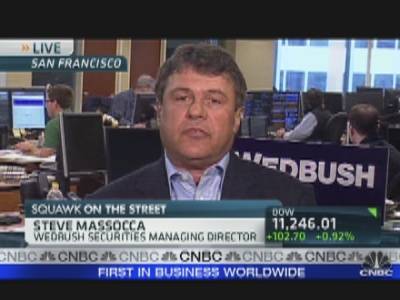Earnings 'Stink' So Far, But Stock Selloff May Be Limited
By: Patti Domm
CNBC Executive News Editor
CNBC Executive News Editor
Stocks got slammed Friday by
worse-than-expected quarterly results, but the damage may be limited because
Wall Street was already expecting a nasty earnings season.
 |
|
Getty
Images
|
The current estimates—as well as
actual reports—now anticipate a 1.8 percent profit decline among the S&P 500
companies for the third quarter, the first decline since 2009.
The big surprise so far has been
the extent of the earnings hits felt by the technology sector, with its
international exposure and the slowdown in PC sales.
Sixty percent of the S&P
companies that had reported as of Thursday saw earnings per share above
estimates, Thomson Reuters says. But that is below the typical 62 percent and
below the recent average of 67 percent.
Even more of a concern is that a
substantial number of companies have bombed on revenues, with top line misses an
unusually high 58.6 percent, above the recent trend of 45 percent and 10-year
trend of 38 percent, according to Thomson Reuters.
“I still feel like it’s telling us
what we already know," said Thomas Lee, chief U.S. equity strategist at J.P.
Morgan. "Earnings stink because the global economy slowed down. Europe is in
recession, and China slowed down.”
Stocks earlier this week flirted
with 2012 highs, even as a number of major companies saw earnings or revenues—or
both—fall short of estimates. But the tide turned Thursday as stocks traded
slightly lower while investors digested Google’s
[GOOG 681.79  -13.21 (-1.9%)
-13.21 (-1.9%)
 ]
big earnings shortfall and its shares weighed on indexes.
]
big earnings shortfall and its shares weighed on indexes.
 -13.21 (-1.9%)
-13.21 (-1.9%)
By Friday, however, a series of
blue chips led the market
lower, with misses by Dow stocks Microsoft
[MSFT 28.64  -0.855 (-2.9%)
-0.855 (-2.9%)
 ]
, General Electric
[GE 22.03
]
, General Electric
[GE 22.03  -0.78 (-3.42%)
-0.78 (-3.42%)  ]
and McDonald’s
[MCD 88.72
]
and McDonald’s
[MCD 88.72  -4.14 (-4.46%)
-4.14 (-4.46%)
 ]
smacking their stocks and taking the Dow sharply lower. GE is
the minority shareholder of NBCUniversal. (Read More: Track Earnings Here)
]
smacking their stocks and taking the Dow sharply lower. GE is
the minority shareholder of NBCUniversal. (Read More: Track Earnings Here)
 -0.855 (-2.9%)
-0.855 (-2.9%)
 -0.78 (-3.42%)
-0.78 (-3.42%)  -4.14 (-4.46%)
-4.14 (-4.46%)
But strategists make a case that
some of these stumbles are already in the price of stocks.
“We surveyed clients two weeks
ago," said Tobias Levkovich, chief U.S. equity strategist at Citigroup. "Eighty
percent told us earnings estimates are too high.”
Going into the earnings season,
analysts had expected the companies that had exposure to foreign currencies,
China and Europe to be the most likely to misstep. The domestically oriented
companies, the theory went, would be less inclined to miss because of a slightly
stronger U.S. economy and an increasing willingness by American consumers to
spend.
But McDonald’s profit pain
also came from the U.S. The global fast food chain’s earnings fell
about four percent, due to the stronger dollar’s impact on international result
but also “broad competitive activity” in the U.S.
McDonald’s revenue in the U.S. in
stores open 13 months grew by 1.2 percent while globally, restaurant revenue
rose 1.9 percent, the slowest pace since 2003.
“I think the U.S. surprised the
most on same store sales, as well as on the margin front,” said Lazard Capital
Markets restaurant analyst Matthew DiFrisco on CNBC’s “Squawk on the Street.” “I
think that’s what’s weighing on the shares.”
U.S. restaurant chain
Chipotle
[CMG 243.00  -42.93 (-15.01%)
-42.93 (-15.01%)
 ]
also saw sluggish
trends in its restaurants, and its earnings miss sent
its stock skidding in a double digit decline Friday.
]
also saw sluggish
trends in its restaurants, and its earnings miss sent
its stock skidding in a double digit decline Friday.
 -42.93 (-15.01%)
-42.93 (-15.01%)
The earnings performance of
financials, health care and staples has been the best.
“We started off strong, as the
financials generally had a really good earning season,” said Bill Stone, chief
investment strategist at PNC Wealth Management. “The staples look like they’ve
done well but again we’re early in the season.” According to Thomson Reuters,
financial companies beat earnings estimates 72 percent of the time this quarter,
while consumer staples beat 70 percent.
But on a revenue basis, 82 percent
of health care companies had negative surprises, while 83 percent of industrial
companies had misses, and 67 percent of materials companies’ revenues came up
short, according to the Thomson Reuters data.

No comments:
Post a Comment